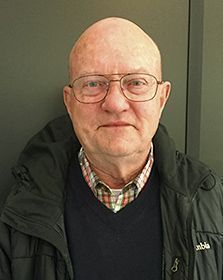Former Army Colonel Wilkerson says Marine Corps in Okinawa is “strategically unnecessary”

Former U.S. Army Colonel Lawrence Wilkerson
December 23, 2018 Ryukyu Shimpo
By Washington Special Correspondent Yukiyo Zaha
On December 19 former U.S. Army Colonel Lawrence Wilkerson, who worked as the chief of staff to U.S. Secretary of State Colin Powell during George W. Bush’s administration, had an interview with the Ryukyu Shimpo. In the early 1990s when Wilkerson served in leadership roles at the Marine Corps War College in Virginia, he analyzed investigations and research concerning the realignment and closure of U.S. bases that occurred after the Cold War. The results of his analyses revealed that a large portion of the stationing costs fell on the Japanese government, so that the expenses of maintaining the Marine Corps in Okinawa cost the U.S. 50 to 60 percent less than it would to maintain the Marine Corps in California. Wilkerson said that the whole analysis demonstrated that, “There was no genuine strategic need for those Marines on Okinawa. It was all about money and keeping them.”
It is unusual for a former high-level official of the U.S. military to declare that there is no strategic necessity for the Marine Corps being stationed on Okinawa.
Wilkerson is a key member of the Overseas Base Realignment and Closure Coalition (OBRACC), a group made up of U.S. intellectuals and former U.S. officials. OBRACC released a letter requesting the closure of U.S. military bases abroad, and addressed the letter to President Trump, Secretary of Defense Mattis, and Congress.
Concerning the Japanese government paying for Marine Corps stationing in Okinawa, Wilkerson said, “The costs on Okinawa were about 50-60 percent cheaper than the cost would be if those Marines were retained and kept in the United States, such as California. The Marines were looking at costs in California, principally.” This made it convenient for the U.S. in terms of public finance, and made it an economically poor choice for the U.S. to bring the Marines back to U.S. land. Because bases had also been closed in the United States, Marine Corps leaders were reluctant to close bases in Okinawa. Wilkerson explained that, “It was also looked at as bad to do by the Marine Corps leadership because they felt, in the spirit of the time, that if they brought those Marines home they would lose them. In other words, they would just cut them out. No more bodies. So, they were fearful of that.”
There is cause for concern that things such as climate change and natural disasters will cause financial losses on U.S. military facilities. As part of construction of the Futenma Replacement Facility in Henoko, Wilkerson says “it’s crazy” to build runways over the ocean at great expense.
The Japanese government insists that the Marine Corps presence in Henoko is for “deterrence.” In response Wilkerson points out, “There is a two-edged sword. On this side, yes. On the other side, making China re-arm, and making China spend more money on its military. Making China a more powerful, formidable enemy.”
Wilkerson explained that even if there were a conflict on the Korean peninsula, it would be unlikely that the Marines would be helpful. He said, “We used to say we’d probably get there after [the conflict] was over. Or if they did get there at all, they would simply be a minor addition to 600,000 Koreans. So, there was no real strategic reason.”
In addition, Wilkerson spoke about the U.S.-Japan Alliance and Japan’s defense. He explained, “It is a commitment to Japan and to the defense of Japan in public affairs terms, yes. That argument can be made. If you want to say that there is a strategic purpose for the presence on Okinawa, it’s the same strategic purpose for the presence in Yokosuka or anywhere else in Japan, like Misawa. It’s to convince the Japanese that we are indeed part of their security. The only really truly strategic asset in the Pacific for the United States of America, for our own national security interests, is Hawaii.”
(English translation by T&CT and Erin Jones)
Previous Article:Okinawa Prefectural Assembly demands immediate halt to soil deposits in Henoko
Next Article:Base relocation issue taught in Portland school
[Similar Articles]
- U.S. coalition calls for closure of overseas U.S. bases in line with Okinawans’ wishes
- U.S. Marine Corps considers a new jungle warfare training facility near the United States
- Editorial: U.S. scholars request base closure as new base construction goes against global trend
- “We could remove the Marines from Okinawa” suggests U.S. Congressman Frank
- [Editorial]10th anniversary of US chopper crash onto Okinawa International University: Marine Corps should be withdrawn from Okinawa
 Webcam(Kokusai Street)
Webcam(Kokusai Street)


